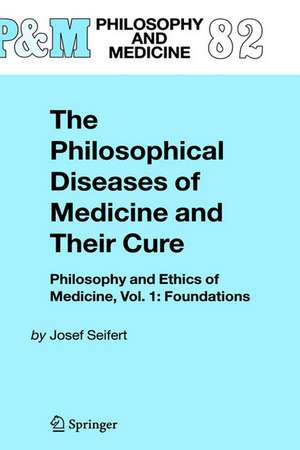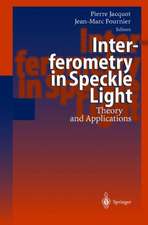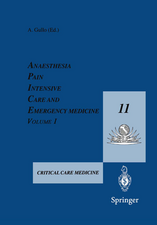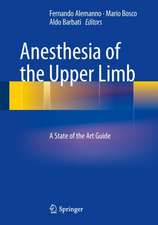The Philosophical Diseases of Medicine and their Cure: Philosophy and Ethics of Medicine, Vol. 1: Foundations: Philosophy and Medicine, cartea 82
Autor Josef Seiferten Limba Engleză Hardback – 29 oct 2004
| Toate formatele și edițiile | Preț | Express |
|---|---|---|
| Paperback (1) | 1417.75 lei 6-8 săpt. | |
| SPRINGER NETHERLANDS – 5 dec 2010 | 1417.75 lei 6-8 săpt. | |
| Hardback (1) | 1425.04 lei 6-8 săpt. | |
| SPRINGER NETHERLANDS – 29 oct 2004 | 1425.04 lei 6-8 săpt. |
Din seria Philosophy and Medicine
- 18%
 Preț: 3071.11 lei
Preț: 3071.11 lei - 18%
 Preț: 789.52 lei
Preț: 789.52 lei - 15%
 Preț: 636.80 lei
Preț: 636.80 lei - 15%
 Preț: 643.16 lei
Preț: 643.16 lei - 15%
 Preț: 644.95 lei
Preț: 644.95 lei - 18%
 Preț: 949.23 lei
Preț: 949.23 lei - 5%
 Preț: 1154.22 lei
Preț: 1154.22 lei - 18%
 Preț: 1223.74 lei
Preț: 1223.74 lei - 15%
 Preț: 645.60 lei
Preț: 645.60 lei - 18%
 Preț: 949.23 lei
Preț: 949.23 lei - 15%
 Preț: 644.49 lei
Preț: 644.49 lei - 18%
 Preț: 948.79 lei
Preț: 948.79 lei - 24%
 Preț: 780.13 lei
Preț: 780.13 lei - 18%
 Preț: 1227.04 lei
Preț: 1227.04 lei -
 Preț: 395.85 lei
Preț: 395.85 lei - 5%
 Preț: 1103.95 lei
Preț: 1103.95 lei - 18%
 Preț: 945.30 lei
Preț: 945.30 lei - 18%
 Preț: 1383.94 lei
Preț: 1383.94 lei - 15%
 Preț: 643.34 lei
Preț: 643.34 lei - 18%
 Preț: 1130.45 lei
Preț: 1130.45 lei - 15%
 Preț: 640.55 lei
Preț: 640.55 lei - 15%
 Preț: 639.59 lei
Preț: 639.59 lei -
 Preț: 389.70 lei
Preț: 389.70 lei - 18%
 Preț: 948.61 lei
Preț: 948.61 lei - 5%
 Preț: 1092.79 lei
Preț: 1092.79 lei - 20%
 Preț: 557.46 lei
Preț: 557.46 lei - 15%
 Preț: 642.36 lei
Preț: 642.36 lei -
 Preț: 385.08 lei
Preț: 385.08 lei - 15%
 Preț: 644.95 lei
Preț: 644.95 lei
Preț: 1425.04 lei
Preț vechi: 1500.04 lei
-5% Nou
Puncte Express: 2138
Preț estimativ în valută:
272.71€ • 296.13$ • 229.08£
272.71€ • 296.13$ • 229.08£
Carte tipărită la comandă
Livrare economică 22 aprilie-06 mai
Preluare comenzi: 021 569.72.76
Specificații
ISBN-13: 9781402028700
ISBN-10: 1402028709
Pagini: 444
Ilustrații: XXXVI, 406 p.
Dimensiuni: 210 x 297 x 29 mm
Greutate: 0.8 kg
Ediția:2004
Editura: SPRINGER NETHERLANDS
Colecția Springer
Seria Philosophy and Medicine
Locul publicării:Dordrecht, Netherlands
ISBN-10: 1402028709
Pagini: 444
Ilustrații: XXXVI, 406 p.
Dimensiuni: 210 x 297 x 29 mm
Greutate: 0.8 kg
Ediția:2004
Editura: SPRINGER NETHERLANDS
Colecția Springer
Seria Philosophy and Medicine
Locul publicării:Dordrecht, Netherlands
Public țintă
ResearchCuprins
1 The Nature and the Seven Goals of Medicine as Objects of a Dramatic Free Choice of the Physician Today.- 1. On the Nature of Medicine and the Physician. The Physician as Scientifically Trained Healer, as Practitioner of the ‘Art of Medicine’, as Ethicist, and as Moral Subject.- 2. The Physician-Philosopher: Theoretical and Practical Philosophical and Ethical Aspects of Medicine.- 3. The Physician as Moral Agent and Further Hints at the Philosophical Diseases of Medicine and Their Cure.- 2 The Dignity of the Human Person as a ‘Universal of Medical Ethics’.- 1. Prolegomena.- 2. What Is a Person? Ontological and Axiological Understanding of the Person.- 3. The Four Sources and Dimensions of Human Dignity and Their Characteristics.- 4. Dignity as Object of Rational Knowledge and Answer to Some Objections against the Rational Knowability of Human Dignity.- 5. Human Dignity as a Unifying Bond among Men and Medical Professionals Worldwide.- 3 From the Morally Relevant Goals of Medicine to Medical Ethics On the Superiority of Moral Values over All Extramoral Goals of Medicine.- 1. Introductory Notes on Ethics in Its Relation to Medicine.- 2. The Ambiguity of the Notion of the Good: On the Totally New Quality of Moral Goodness and Evil in Comparison with all Other Goods and Evils.- 3. The Nature of Moral Goodness.- 4. Concluding Remarks.- 4 The Freedom of Choice for or against the Basic Goods and Ends of Medicine Physicians, Nurses, and Other Health Professionals as Agents in the Drama of Freedom.- 1. Towards a Metaphysics and Epistemology of Freedom.- 2. Ethics, Freedom, and Motivation: the Drama of the Physician’s Freedom Can Only Be Understood in the Light of the Free Choice of the End and Not Only of the Means.- 3. Being Free Is Not Restricted to the Sphere ofAction but Encompasses Many Spheres of Human Willing.- 4. Cooperative Freedom and the Affective Dimension of the Gift of Self as an Important Element of Medical Ethics.- 5. Concluding Remarks on the Fundamental Moral Choices in Medicine.- 5 Rational Justification of an Objective and Publicly Acceptable Bioethics A Critique of Ethical Relativism, Skepticism, and Nihilism and an Answer to Engelhardt.- 1. Short Summary of the Results Gained in the Preceding Chapters and of the Problems to Be Treated in Chapter 5.- 2. The Philosophical Plague and Aids of Medicine to Be Discussed in this Chapter and Their Cure.- 3. Are Truth and Goodness Relative?.- 4. Is an Objective Rational Bioethics Possible in Our Pluralistic Society? Engelhardt’s Negative Reply to the Second and Third Questions Posed Above and the Need to Return to Things Themselves.- 5. Is There a Publicly Acceptable Content-full Bioethics?.- 6 Are there absolute moral obligations towards finite goods? A Critique of ‘Teleological Ethics’ and of the Destruction of Bioethics Through Consequentialism On the Invertebratitis of Medical Ethics and its Cure.- 1. Introduction.- 2. The Main Theses of a ‘Teleological’ Foundation of Moral Norms.- 3. Immanent Critique of ‘Consequentialist Ethics’: Its Contents and Implications, Contradictions, and Silent Admissions.- 4. Transcendent Critique of a ‘Purely Teleological’ Ethics.- Epilogue.- Index of Personal Names.
Textul de pe ultima copertă
This book deals with the essential philosophical/ethical dimension that concerns the ends and goods entrusted to medicine. It shows that medicine cannot be reduced to its scientific and technical aspects and that the constitutive philosophical aspects of medicine presently are in a state of crisis.
Medicine, besides being a scientifically based art of diagnosing and curing infirmities of many kinds, also possesses an essential philosophical and ethical dimension. It turns into anti-medicine if it no longer stands in the service of those goods and ends that are entrusted to it. Their nature is in no way known by natural science but can be clarified by philosophy. Consequently, medicine suffers from philosophical diseases of different degrees of gravity if its theory and practice are based on errors about its proper ends. The cure from the life-threatening philosophical diseases of medicine lies in a critique of philosophical mistakes that influence the theory and practice of medicine and in an understanding and practical implementation of those ethically relevant goods that constitute its true ends. At a time when these goods are by no means universally recognized or embodied in laws of medicine, some basic philosophical understanding of them and of the foundations of medical ethics is urgently required. The purpose of this volume is to provide this largely neglected part of general and medical education.
Medicine, besides being a scientifically based art of diagnosing and curing infirmities of many kinds, also possesses an essential philosophical and ethical dimension. It turns into anti-medicine if it no longer stands in the service of those goods and ends that are entrusted to it. Their nature is in no way known by natural science but can be clarified by philosophy. Consequently, medicine suffers from philosophical diseases of different degrees of gravity if its theory and practice are based on errors about its proper ends. The cure from the life-threatening philosophical diseases of medicine lies in a critique of philosophical mistakes that influence the theory and practice of medicine and in an understanding and practical implementation of those ethically relevant goods that constitute its true ends. At a time when these goods are by no means universally recognized or embodied in laws of medicine, some basic philosophical understanding of them and of the foundations of medical ethics is urgently required. The purpose of this volume is to provide this largely neglected part of general and medical education.








